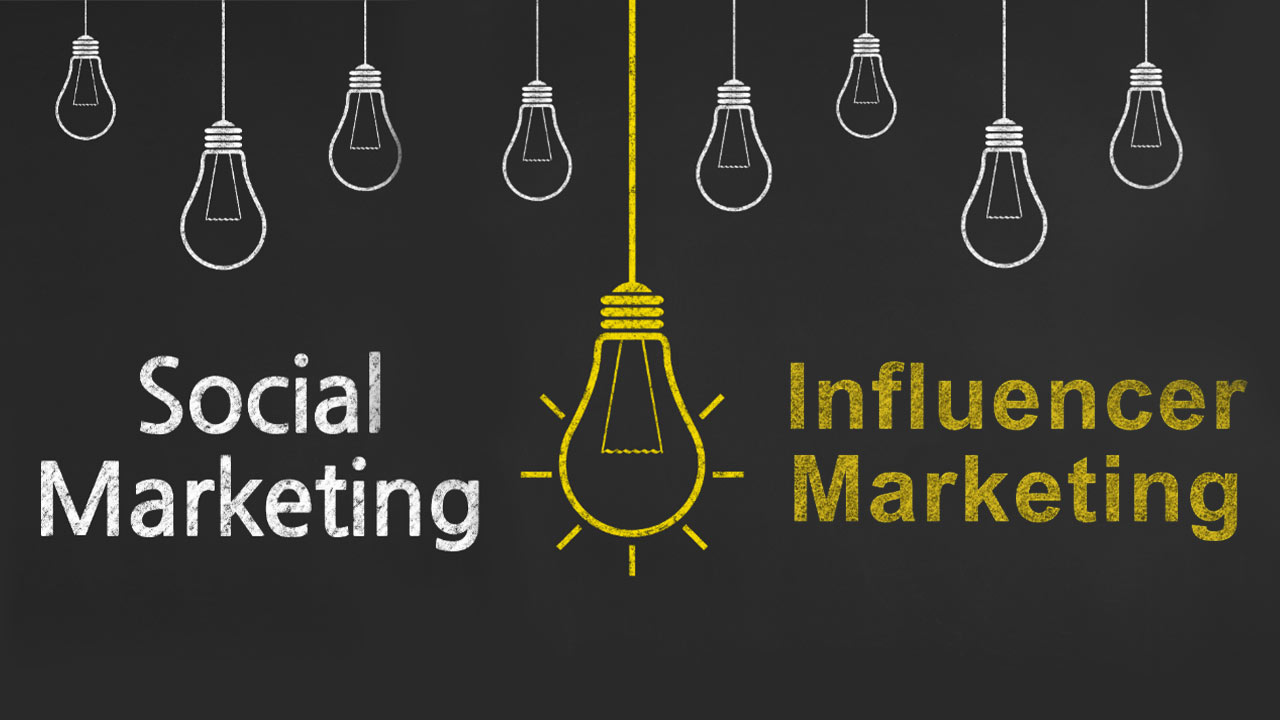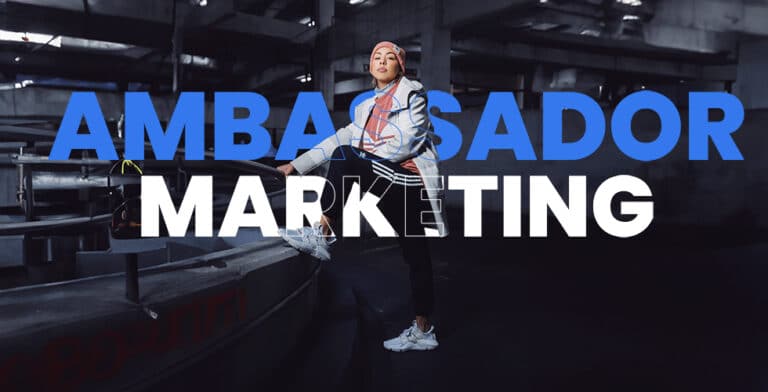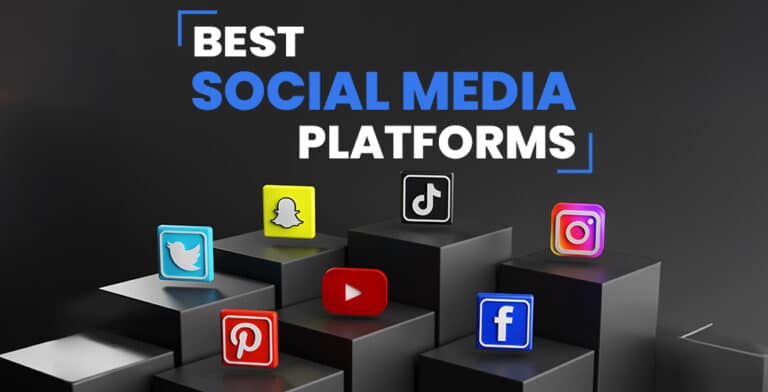What is the gap between influencer and social media marketing? Both techniques can have a major impact on your brand’s income and reputation, so it’s critical to understand the subtle differences between them.
Through engaging content and an active social media presence, brands may establish a personal connection with their audience through social media marketing. Influencer marketing, on the other hand, takes advantage of the trust and social capital of people your target audience already admires and follows.
Influencers have undisputed power. Take, for example, Kylie Jenner, who has 148 million Instagram followers. Her posts frequently acquire millions of “likes” in less than 24 hours. Jenner was even called the youngest self-made billionaire by Forbes, thanks in part to her work as an ambassador for prominent brands like Puma and Adidas, as well as her own brand Kylie Cosmetics, which is worth $900 million. Jenner is an excellent example of how influencer marketing can help to increase brand recognition and revenue.
Indeed, the effect of social media influencers is so powerful that it influences professional decisions. According to a new LEGO survey, children aged 8 to 12 in the United States are three times more likely to desire to be a YouTuber than an astronaut.
Meanwhile, a fast Google search for “social media marketing” yields almost 5 billion results. Clearly, both social media marketing and influencer marketing have enormous potential for increasing brand exposure. However, it is critical to understand the distinctions between the two and select the best strategy for your brand’s specific requirements.
This post will provide vital insights into which strategy is suitable for your company, whether you are a small business owner or a marketing specialist. So, let’s dive in and explore the world of influencer marketing vs social media marketing!
Influencer Marketing
Influencer marketing is a type of marketing that entails cooperating with individuals that have a large social media following and are regarded as experts or prominent in their specialty or business. The purpose of influencer marketing is to promote a company or product to an influencer’s followers by using their credibility, reach, and audience.
Influencers can be found on numerous platforms, including Instagram, YouTube, TikTok, and blogs. They can range from superstars and industry experts to micro-influencers with small yet engaged followings. Influencer marketing can take many different forms, such as sponsored content, product reviews, giveaways, and collaborations. Influencer marketing’s ultimate goal is to raise brand awareness, generate discussion about a product or service, and drive sales.
Influencer marketing is a sort of marketing in which you collaborate with influential people on social media to promote your business or products. Here are some benefits of employing influencer marketing to increase brand awareness:
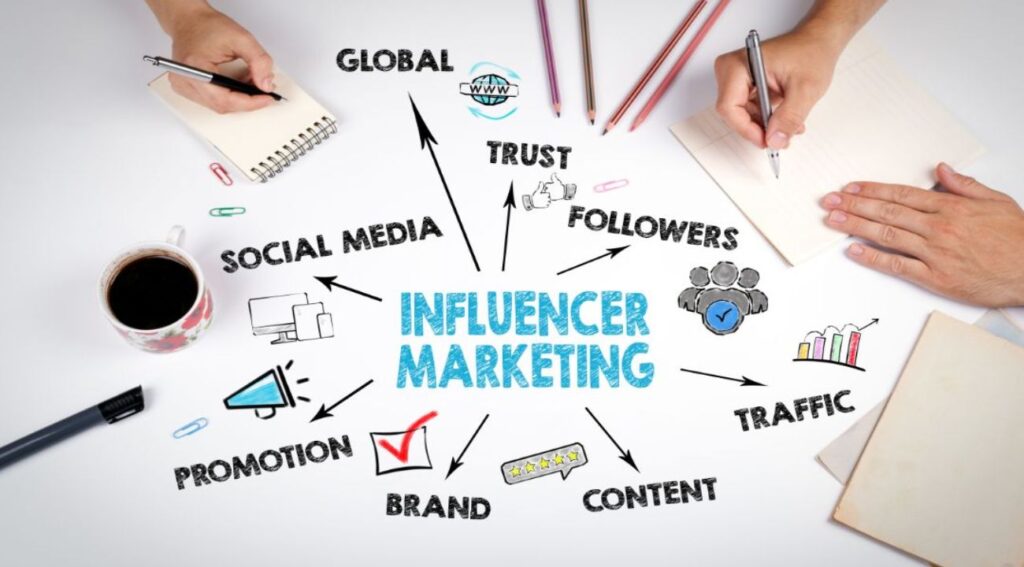
- Targeted audience: Influencers have a specialized niche or audience with whom they routinely interact. You can reach a highly focused audience that is more likely to be interested in your brand or products by collaborating with an influencer in your industry or niche.
- Authenticity: Influencers are known for being genuine and credible to their followers. When an influencer endorses your company, their followers are more inclined to trust and engage with it because it comes from someone they respect.
- Collaboration: Collaboration with an influencer can improve your brand’s trust and reputation. When an influencer supports your product, their followers are more inclined to think of it as high-quality.
- Creativity: Influencers are frequently original and creative in their content development. When you collaborate with an influencer, you can tap into their creativity to generate unique, engaging content that appeals to your target audience.
- Increased reach: Because influencers have enormous social media followings, collaborating with them can increase your brand’s reach and visibility. This can boost brand awareness and interaction with your target demographic.
While influencer marketing has become a popular option for firms trying to raise brand awareness, it is not without drawbacks. Here are three major constraints to consider.
- High costs: Influencer marketing initiatives may be costly, especially when dealing with well-known influencers. While the ROI can be substantial, smaller firms with limited finances may struggle to cover the costs of influencer marketing.
- Difficulty in quantifying ROI: Influencer marketing, unlike other marketing tactics, can be difficult to quantify in terms of its impact on brand recognition. Metrics like engagement and follower growth can provide some insight, but they may not always correctly reflect a campaign’s success.
- Potential risks of working with influencers: Influencers are individuals, and they, like all people, make mistakes. If an influencer with whom they work gets into difficulty, brands risk being connected with negative behavior or controversy. This might result in unwanted publicity and brand reputation damage.
Despite these limits, influencer marketing may be a powerful tool for increasing brand recognition. However, it is critical to assess the benefits and drawbacks and determine whether this is the best plan for your company.
Social Media Marketing
Social media marketing is a digital marketing technique that involves promoting a business or brand through social media networks. Social media marketing is to raise brand awareness, engage customers, and eventually drive traffic and revenues to a website or product.
Social media marketing can include a variety of activities such as developing and sharing material such as text, photographs, and videos, interacting with customers through comments and messages, and running paid advertising campaigns on social media platforms.
A company that sells beauty items, for example, may use social media marketing to highlight its products, communicate with clients, and promote special deals. They could develop aesthetically appealing posts and videos showcasing the benefits of their products, run paid ads to target certain demographics, and promptly reply to customer inquiries and reviews.
Social media marketing can be done on several different social media platforms, including Facebook, Twitter, Instagram, LinkedIn, Pinterest, and YouTube, each having its audience and features. Understanding your target audience and providing content that resonates with them, while being true to your brand identity and values, is the key to successful social media marketing.
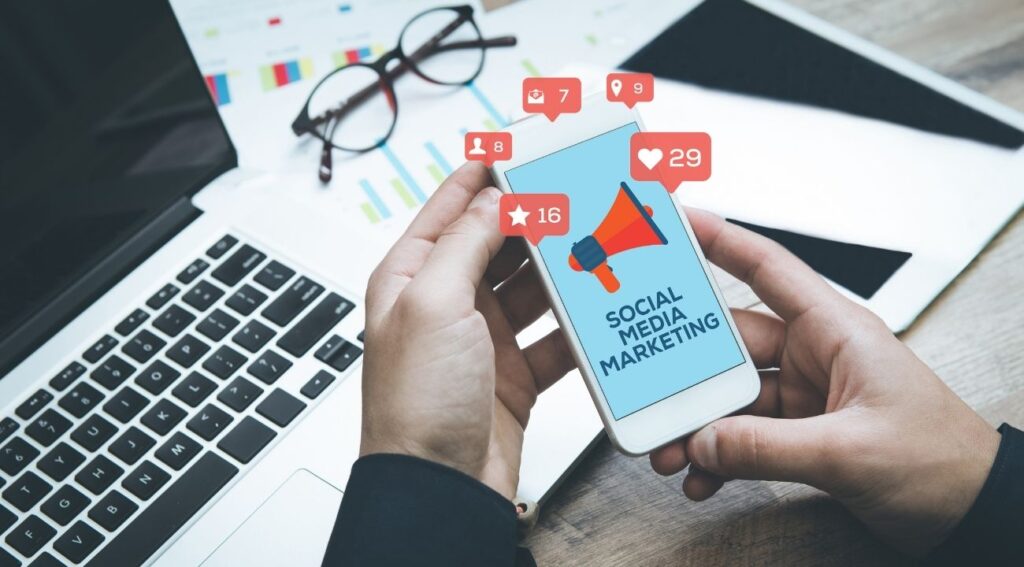
Here are some advantages of using social media marketing for building brand awareness:
- Economical: Social media platforms provide businesses with a low-cost way to advertise their brand and reach a big audience. Unlike traditional advertising tactics such as television or print advertisements, social media marketing can be done at a low cost.
- Reaching a broad audience: With billions of users on social media sites like Facebook, Instagram, and Twitter, businesses may reach a vast potential audience. Businesses can use social media marketing to reach a diverse group of people from various places, demographics, and hobbies.
- Measurable ROI: Social media marketing gives firms valuable measurements and data for measuring campaign success. Businesses may track engagement, impressions, reach, and conversions with analytics tools, allowing them to make data-driven decisions and improve their campaigns for better outcomes.
- Reaching a broad audience: With billions of users on social media sites like Facebook, Instagram, and Twitter, businesses may reach a vast potential audience. Businesses can use social media marketing to reach a diverse group of people from various places, demographics, and hobbies.
- Customer engagement: Social media platforms enable businesses to interact with and create connections with their customers. Businesses can demonstrate to their customers that they care about their needs and opinions by reacting to comments and messages, which can increase customer loyalty and trust in the brand.
While social media marketing can be a powerful tool for building brand awareness, there are several limitations to
- While social media networks contain billions of users, not all of them may be interested in or aware of your brand. Furthermore, social media algorithms prioritize content based on engagement, which means that even if you have a large following, your content may not be seen by all of your followers.-
- Social media is a congested environment, with various brands competing for attention. Standing out in such a competitive climate can be difficult, especially if you have a limited budget.
- While social media marketing can be an effective technique for increasing company exposure, there are a few drawbacks to consider:
- While social media networks contain billions of users, not all of them may be interested in or aware of your brand. Furthermore, social media algorithms prioritize content based on engagement, which means that even
- Social media is a congested environment, with various brands competing for attention. Standing out in such a competitive climate can be difficult, especially if you have a limited budget.
Overall, social media marketing can be a valuable tool for building brand awareness, but it is not without its limitations. It is important to consider these limitations when developing your marketing strategy and to explore other marketing channels that may better align with your business goals.
Which Strategy is More Effective for Building Brand Awareness?
Both social media marketing and influencer marketing can be effective strategies for building brand awareness, but the effectiveness of each strategy depends on various factors such as the target audience, budget, and marketing goals. Influencer marketing can be more effective for reaching a specific group of people already interested in the influencer’s content, while social media marketing can be effective for reaching a broader audience.
Social media marketing is more cost-effective while measuring the ROI is easier compared to influencer marketing, which can be expensive and challenging to measure. Ultimately, businesses should consider their specific needs and goals to determine which strategy is best for building their brand awareness.
Effectiveness Of Each Strategy
In terms of effectiveness for building brand awareness, both influencer marketing and social media marketing have proven to be successful strategies.
Influencer marketing can be particularly effective in generating brand awareness through the use of social media influencers with large, engaged followings. These influencers can promote a brand or product to their followers, who are often already interested in the influencer’s content, leading to increased brand exposure and awareness. The influencer’s endorsement can also lend credibility to the brand, which can help to build trust with potential customers.
Social media marketing, on the other hand, can be effective in building brand awareness through the use of targeted advertising campaigns. Social media platforms offer a variety of targeting options, including demographic, interest-based, and behavioral targeting, which can help brands reach their ideal audience. Additionally, social media advertising can be relatively inexpensive compared to other forms of advertising, making it an attractive option for businesses of all sizes.
While both strategies have proven effective for building brand awareness, each has its own limitations that should be considered. Influencer marketing can be expensive, and the success of a campaign can be difficult to measure, making it challenging to determine ROI. Social media marketing, on the other hand, can be oversaturated, with a high volume of competing content, making it challenging to stand out among competitors.
Ultimately, the effectiveness of each strategy will depend on a variety of factors, including the target audience, budget, and marketing goals of the business. In some cases, a combination of both influencer marketing and social media marketing may be the most effective approach to maximize brand exposure and build brand awareness.
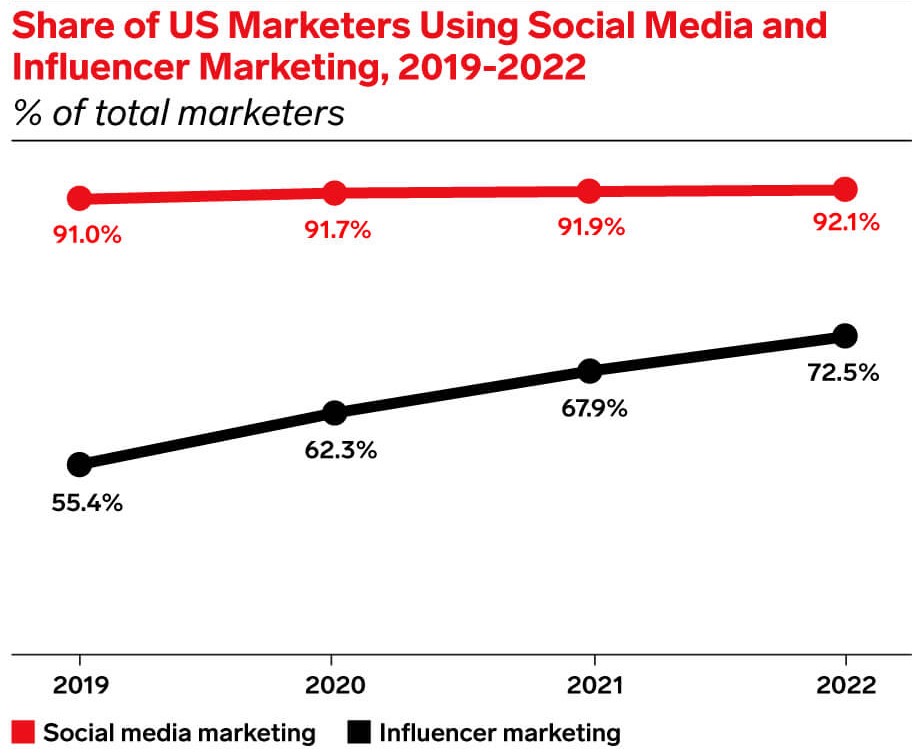
Factors To Consider When Choosing Between The Two Strategies
There are numerous marketing methods to consider when it comes to increasing brand awareness. Influencer marketing and social media marketing are two common tactics. While both can be effective in terms of reaching a broad audience and promoting your business, there are important differences to consider when determining which method to adopt. Consider the following factors:
- Target audience: When picking between influencer marketing and social media marketing, it is critical to understand your target demographic. Examine your target audience and where they spend their time online. Influencer marketing may be more effective if your target audience is more likely to be influenced by popular social media celebrities. However, if your target demographic is more likely to interact with brand material on social media platforms, social media marketing may be the superior option.
- Budget: When deciding between influencer marketing and social media marketing, budget is a vital factor to consider. Influencer marketing campaigns can be more expensive than social media marketing efforts, therefore it’s critical to assess your budget and the expected ROI for each technique.
- Goals: Consider your specific aims for increasing brand recognition. If you want to enhance interaction and establish a strong social media community, social media marketing may be the best option. Influencer marketing may be more effective if your goal is to improve brand recognition and credibility through endorsements from well-known influencers.
- Brand fit: Select influencers or social media channels that align with your brand’s beliefs and image. Influencer marketing initiatives can be highly effective when the influencer’s audience matches your target demographic and the influencer reflects your business favorably. When the platform resonates with your brand’s beliefs and image, social media marketing initiatives can be beneficial.
- Measurability: Measuring your marketing strategy’s success is critical for determining ROI and making informed decisions about future efforts. Social media marketing provides more quantitative metrics such as likes, comments, and shares, however, influencer marketing may be more difficult to calculate ROI for.
- Timeframe: Consider the timeframe in which you want to achieve your marketing goals. Influencer marketing initiatives may require more time to create contacts and negotiate conditions, whereas social media marketing campaigns can be launched more rapidly.
Needless to say, “Influencer marketing and social media marketing are both excellent methods for increasing brand recognition. Influencer marketing gives a brand’s audience targeted and authentic exposure, but it may be pricey and difficult to assess ROI, and there are potential hazards connected with dealing with influencers.
On the other hand, social media marketing is less expensive and can reach a huge audience with demonstrable ROI, but it can be difficult to stand out among competitors and has less credibility than influencer marketing.”
Businesses should evaluate their budget, target demographic, brand goals, and the level of credibility and authenticity they want to express when deciding between the two techniques. Finally, the most effective technique will be determined by the specific needs and circumstances of each individual.
Businesses could explore combining influencer marketing and social media marketing to increase brand exposure, with each technique complementing the other. Businesses can construct a more well-rounded and effective marketing campaign by combining the strengths of both approaches.
Overall, understanding the specific benefits and limits of each method and strategically employing them to get the desired results is the key to success in brand awareness promotion.

